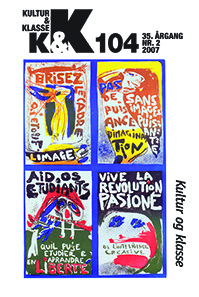Introduktion til Social Formalism (1998)
DOI:
https://doi.org/10.7146/kok.v35i104.22280Nøgleord:
social formalism, Dorothy Hale, 1998, cultural studies, world, work, novel theoryResumé
Introduction to Social Formalism (1998)
In this introductory chapter to her book Social Formalism: The Novel in Theory from Henry James to the Present (1998), Dorothy Hale is engaging a double polemic against the dominating tradition within cultural studies and argues that not only does this tradition, which claims to have more interest in the ‘world’ than in the ‘work’, base its studies in classical literary works; it has also lost sight of the relevant theoretical approaches. To Hale, a reactualization of ‘novel theory’ is therefore emergent, and it is the aim of her study to show that the critique that has been raised against formalistic-oriented novel theory for not having any other interest in the novel than the description of its ‘literariness’ is wrong. Literary theorists like Henry James, Percy Lubbock, Wayne Booth, Gérard Genette and Michail Bachtin have shared the conviction that the novel, through its formal aspects, embodies the author’s vision of both social identity and social reality – no matter whether this is formulated as Lubbock’s ‘vision’, Genette’s ‘voice’ or Bachtin’s ‘dialogicity’. In this respect, these theorists are not as far from the sociocultural approaches of Eve Kosofsky Sedgwick, Barbara Johnson and Henry Louis Gates as is claimed. They are connected insofar as they share a social formalistic interest, i.e. they consider the formal aspects of the text as an expression for and a result of a specific and historically variable social formation.
Downloads
Publiceret
Citation/Eksport
Nummer
Sektion
Licens
Tidsskriftet følger dansk ophavsret.





